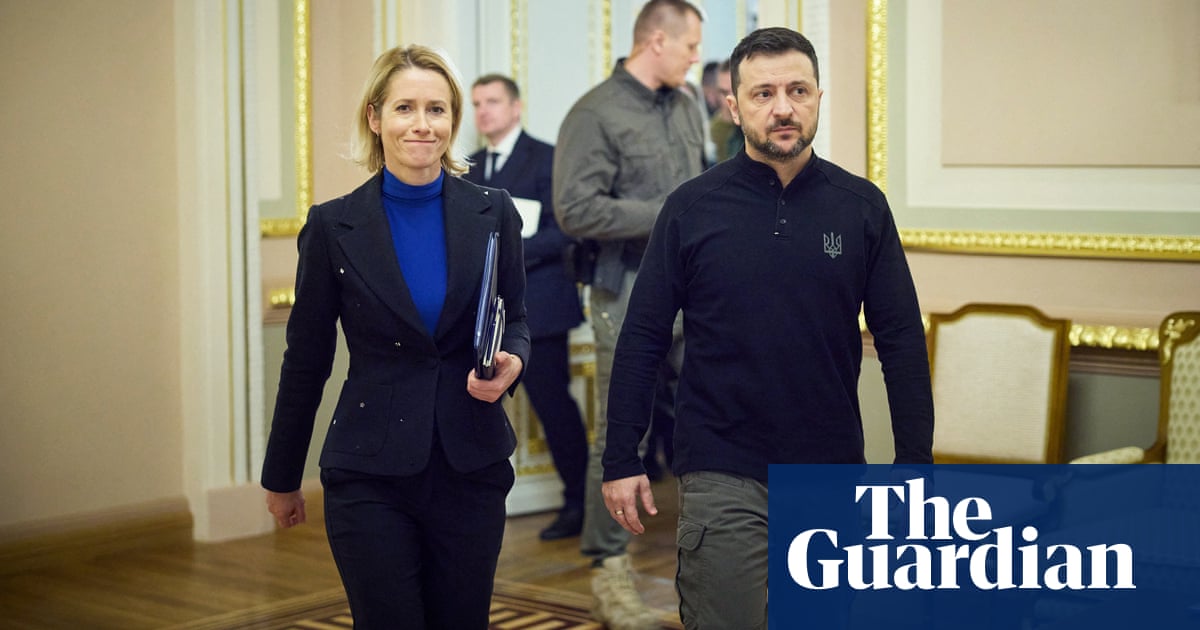Ukraine’s president, Volodymyr Zelenskyy, said on Sunday there was still time to convince “sceptics” that Ukraine should be invited to join Nato. “An invitation for Ukraine to join Nato is a necessary thing for our survival,” Zelenskyy said. On Friday, Zelenskyy said that Nato protection for the free part of Ukraine could end the “hot war”, leaving Kyiv to regain the Russian-occupied areas through diplomatic means.
Zelenskyy said on Sunday that his country needed security guarantees from Nato and more weapons to defend itself before any talks with Russia. He called for “steps forward with Nato” and a “good number” of long-distance weapons for Ukraine to defend itself. “Only when we have all these items and we are strong, after that, we have to make the very important … agenda of meeting with one or another of the killers,” he said, adding that the EU and Nato should be involved in any negotiations. Zelenskyy made the comments after meeting the EU’s new top diplomat, Kaja Kallas, and the EU council chief, Antonio Costa, who were visiting Kyiv as a show of support on their first day in office.
Kallas said before their meeting that for Kyiv “the strongest security guarantee is Nato membership … We need to definitely discuss this – if Ukraine decides to draw the line somewhere, then how can we secure peace so that Putin doesn’t go any further.” Kallas said the EU “shouldn’t really rule out anything” in terms of the question of sending European troops to help enforce any ceasefire. “We should have this strategic ambiguity around this,” she said.
Jennifer Rankin writes from Brussels that it is no surprise Kallas went to Ukraine on her first day as the EU’s chief diplomat. “My message is clear: the European Union wants Ukraine to win this war,” said Kallas, who stood down as Estonia’s prime minister to take the job.
At least three people were killed in a Russian drone attack on the southern Ukrainian city of Kherson, the regional governor said on Sunday. Seven more people were wounded in the morning attack on public transportation, Oleksandr Prokudin said. Russian forces withdrew from Kherson city in late 2022 but have regularly attacked with artillery and drones from the other side of the Dnipro river.
Dan Sabbagh, the Guardian’s defence and security editor, has written about Syrian rebels’ stunning takeover of Aleppo amid deteriorating Russian military support for the regime of Bashar al-Assad. “It was not Kyiv that fell in three days, but Aleppo … Russia is not the force it was in Syria in the last decade, because Moscow has shifted its military focus and resources to its invasion of Ukraine.”
Germany’s foreign minister, Annalena Baerbock, has accused China of providing Russia with weapons for its war against Ukraine and threatening peace in Europe and the Indo-Pacific. “Instead of taking responsibility for peace and security in the world as a permanent member of the UN security council, China is opposing our core European interests with its economic and weapons aid to Russia,” said Baerbock, who will travel to China next week to meet with her counterpart, Wang Yi, and discuss issues including the war in Ukraine.
“Putin’s brutal war of aggression against Ukraine is a direct threat to our peace,” Baerbock said. “I will also speak in Beijing about the fact that we cannot simply ignore this in our relations with China.” The war in Ukraine showed how security in Europe was inextricably linked with that in Asia, Baerbock said. “If North Korea sends soldiers and weapons against Ukraine, while Russia supports Pyongyang’s nuclear programme, then this jeopardises peace both here and in the Indo-Pacific,” Baerbock said.
The US is not considering restoring to Ukraine the nuclear weapons capability it gave up after the Soviet Union collapsed, the White House national security adviser, Jake Sullivan, said on Sunday. It follows a New York Times article that said some unidentified western officials had suggested Joe Biden could do so. “That is not under consideration, no. What we are doing is surging various conventional capacities to Ukraine so that they can effectively defend themselves and take the fight to the Russians, not nuclear capability,” Sullivan told US network ABC.
The world’s 100 biggest defence equipment makers increased their arms sales by 4.2% in 2023 to US$632bn, fuelled by wars and regional tensions, the Stockholm International Peace Research Institute (Sipri) said on Monday. US groups on Sipri’s list grew sales by 2.5% in total compared with the year before to $317bn. Market leaders Lockheed Martin and RTX however saw slightly lower arms sales. European companies on the list – excluding Russian – had roughly unchanged combined sales in 2023 at $133bn but order intake surged and some groups saw a surge in demand linked to the war in Ukraine.

